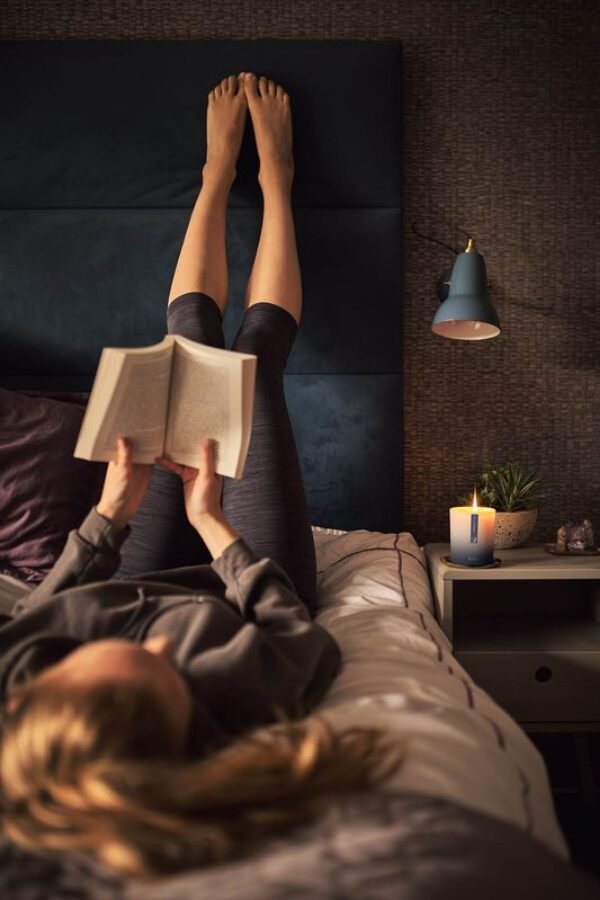Ditch Sleepless Nights: 12 Hacks to Optimise your Sleep
Do you need to get better sleep?
Despite how important sleep is to physical and mental well-being, you may sometimes find it challenging to get enough quality sleep each night. Your daily sleeping routine, or sleep hygiene, can improve your quality of sleep.
"
In this article, we will examine how to get a better night’s sleep and provide step-by-step instructions for enhancing your sleeping patterns.
- Table of Content
- 12 Hacks to Optimise your Sleep
- Final Thoughts
Our strategy for improving your sleep contains particular measures you can take to help you fall asleep, and wake up feeling refreshed.
So here is the list of eleven hacks to optimise your sleep patterns.
12 Hacks to Optimise your Sleep
1. Maintain a Consistent Sleep Schedule
Consistency is the key of a healthy and restorative sleep routine, and establishing a consistent sleep schedule is a powerful tool in achieving this. Our bodies operate on a natural internal clock that regulates various physiological processes, including the sleep-wake cycle.
When we maintain a regular sleep schedule, we align our daily activities with this internal rhythm, promoting better overall sleep quality and well-being.
To establish a consistent sleep schedule, it’s important to prioritise both bedtime and wake-up time. Aim for the recommended 7-9 hours of sleep for adults, by adjusting your sleep schedule based on individual needs.
Select a bedtime that allows for adequate sleep duration and aligns with your lifestyle, considering factors such as work, family obligations, and personal preferences.
2. Create a Relaxing Bedtime Routine
Consistency extends beyond just the hours of sleep; it includes the entire sleep routine. Create a pre-sleep routine that signals to your body that it’s time to wind down. Engage in calming activities, such as reading a book, taking a warm bath, or practising relaxation exercises.
Consider incorporating gentle stretches or yoga into your routine. These activities not only promote physical relaxation but also help release any accumulated tension in your muscles. Choose poses that are comfortable and emphasise slow, deliberate movements to encourage a sense of tranquillity.
3. Limit your Exposure to Screens
In our digital age, where screens are omnipresent in our daily lives, limiting exposure to screens, especially before bedtime, has become a crucial aspect of promoting healthy sleep.
As you approach bedtime, limit exposure to screens. The blue light emitted by devices can suppress melatonin production, disrupting your natural sleep-wake cycle. If you need to use electronic devices, consider using blue light filters or dimming the screen brightness.
Ideally, aim to reduce screen time at least one hour before bedtime. This allows your body to naturally transition into a state of relaxation and promotes the production of melatonin.
4. Practice Mindfulness Meditation
Mindfulness meditation, with or without the aid of guided audio sessions, is a powerful tool for reducing stress and promoting relaxation. As part of your bedtime routine, consider incorporating a brief meditation session to help quiet your mind and create a mental space conducive to sleep.
Engaging in mindfulness meditation before bedtime can quiet a racing mind and promote relaxation. Simple breathing exercises or guided meditations can help alleviate stress and create a tranquil mental space conducive to sleep.
5. Optimise Sleep Environment
Your sleep environment plays a crucial role in the quality of your rest. Optimising your sleep environment is a crucial step toward achieving restful and rejuvenating sleep. Start by regulating the room temperature, aiming for a cool and comfortable setting. Ensure your bedroom is dark, and quiet.
Prioritise comfortable bedding, selecting a mattress and pillows that support your preferred sleep position. Declutter and organise your bedroom to foster a peaceful and calming environment, removing potential distractions.
6. Watch Your Diet
Quality sleep is intricately connected to our lifestyle choices, and understanding the impact of diet is crucial for optimising our sleep. Consuming stimulants like caffeine close to bedtime can disrupt your ability to fall asleep. Opt for a light, balanced snack if hunger strikes before sleep, choosing foods that won’t cause discomfort.
Heavy meals, particularly those high in fats and proteins, can lead to indigestion and discomfort, adversely affecting the quality of your sleep. Striking a balance in your evening food choices, avoiding excesses, and being mindful of timing contribute to a digestive system that works harmoniously with your sleep cycle.



7. Exercise Regularly
Incorporating regular physical activity into your routine is a powerful ally in the quest for improved sleep quality. Engaging in at least 30 minutes of moderate exercise most days of the week promotes overall well-being and has a positive impact on sleep. However, timing is key.
Avoid intense workouts close to bedtime, as the stimulating effects of exercise can linger and make it challenging to wind down. Instead, schedule your workouts earlier in the day to harness the sleep-enhancing benefits of regular physical activity.
8. Limit Naps
Napping can also disrupt your sleep quality. While short power naps can provide a quick energy boost and enhance alertness, long or irregular napping during the day can interfere with nighttime sleep. If you find yourself needing a nap, aim to keep it brief, ideally between 20-30 minutes, to prevent entering deep sleep cycles that can result in grogginess.
Additionally, avoid napping too late in the day, as this can disrupt your sleep and make it harder to fall asleep at night. Striking the right balance with napping can help you harness its benefits without compromising your nighttime rest.
9. Avoid Clock-Watching
The habit of constantly checking the clock can be a significant source of stress and anxiety, particularly when fretting about the amount of sleep attained. This undue focus on time can exacerbate sleep-related concerns and hinder the ability to relax. One effective strategy is to turn the clock away from view, removing the visual cue that may trigger worries about the ticking minutes.
Trusting in the established sleep routine and allowing the natural flow of the bedtime ritual to guide your rest can help alleviate clock-related stress, fostering a more peaceful and undisturbed sleep experience.
10. Limit Liquid Intake Before Bed
Managing liquid intake in the hours leading up to bedtime is a practical measure to minimise disruptions during the night. Consuming excessive fluids close to bedtime can lead to more frequent trips to the bathroom, interrupting the continuity of sleep. By consciously limiting liquid intake, especially of caffeinated and diuretic beverages, you create an environment that supports uninterrupted sleep.
This simple adjustment, combined with other sleep hygiene practices, contributes to a more restful and consolidated sleep experience, enhancing the overall quality of your rest.
11. Invest in Blackout Curtains
Acknowledging the impact of natural light on our circadian rhythm, investing in blackout curtains becomes a strategic step in crafting an optimal sleep environment. External light sources, whether from street lamps or early morning sunlight, can disrupt the body’s natural sleep-wake cycle.
Blackout curtains serve as a physical barrier, effectively blocking out external light and creating a darkened space that signals to the body that it’s time to rest. This investment contributes to the overall ambiance of the sleep environment, promoting a more conducive setting for falling asleep and staying asleep throughout the night.
12. Try Aromatherapy
Incorporating aromatherapy into your bedtime routine introduces an additional layer of relaxation for the mind. Essential oils, such as lavender and chamomile, are renowned for their sleep-inducing properties. Whether through a diffuser or direct application to pulse points, the gentle and soothing scents of these oils can create a calming atmosphere. Aromatherapy not only engages the olfactory senses but also encourages a mental shift toward tranquillity.
The power of scented room perfumes in promoting relaxation has been acknowledged for centuries, making it a time-tested and accessible tool for enhancing the quality of your sleep. Experimenting with different essential oils allows you to tailor your aromatherapy experience to suit your preferences, further personalising your sleep environment.
Final Thoughts
In a nutshell!
By paying attention to these elements and customising your sleep environment to align with your preferences, you set the stage for a more restful and peaceful night’s sleep.
Remember that your sleep is extremely important for your overall well-being, and optimising it can positively impact not only the duration but also the quality of your sleep.
Subscribe to new post
The One Liner
Useful Links
Order Related Queries
Useful Links
Order Related Queries






